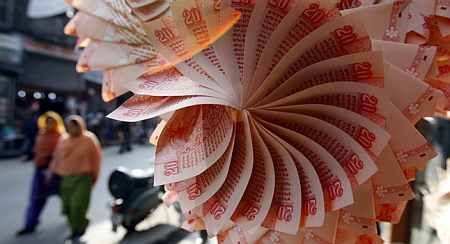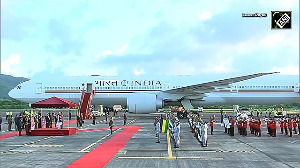 Be prepared to pay more if travelling abroad or if your child is studying there. Other impacts can be varied.
Be prepared to pay more if travelling abroad or if your child is studying there. Other impacts can be varied.
Your family and you are flying to the US next week on holiday.
Flight tickets and hotel bookings were done in advance.
So, why should the rupee depreciation bother you?
It should because all other expenses, such as sightseeing, local transfers and food will increase as a result of the fall in the rupee.
Similarly, if your child is studying in a foreign university, don’t be surprised if tuition fees increase substantially over last year.
There are also some advantages of a falling rupee.
Those working abroad will gain, as the same amount they remit will translate into more rupees.
“It looks like the rupee will be in the 64-65 range (to the dollar).
As the rupee tends to be overvalued and exports are not growing much, the Reserve Bank might be willing to let the rupee depreciate,” says Madan Sabnavis, chief economist, CARE Ratings.
The immediate impact will be on foreign travel and students studying abroad.
The indirect impact will be on other expenses, too, as oil prices will go up and this could push up prices of other commodities.
However, this time, as the price of crude oil in the international market is low, there might not be much of an impact on domestic oil prices, says Sabnavis.
Below is a look at some ways a weaker rupee will impact your life and what you can do about it.
Foreign travel
Europe tours are popular with Indians in the summer months of April to June.
Most people book in October for departures starting in April.
Those who have booked and paid earlier, including the forex component, will not feel much of an impact.
However, travellers who don't pay the forex component in advance might feel the pinch. Usually, travellers pay the deposit and for flight tickets in rupees, in advance.
The forex component, which covers accommodation, meals, sight-seeing and excursions, can be paid later.
“For trips in April, packages are booked as early as October. We pushed many of our customers to pay in advance. Those who did not pay then might feel the pinch now,” says Daniel D’Souza, head of sales, Tour Operating, Kuoni India.
One way to avoid last-minute heartburn is to pay for your entire package in advance and not only the rupee component.
If booking last-minute, choosing a short-haul holiday to a destination closer to home rather than a long-haul holiday is also a way to save some costs.
Tips to save
- Reduce the number of days from 10 to, say, eight
- Reduce the number of excursions
- Switching to a lower category hotel or staying in a bed and breakfast or home stay
- Cut on shopping rather than sight-seeing, since it is the experience that matters
- Opting for public transport such as trains, subway or buses, rather than renting a car
- While sightseeing, choose days when tourists are allowed to go for free or given discounts. Most monuments abroad have such days
- While shopping, buying from flea markets can work out cheaper than from stores
- Take a decent amount of cash with you, as you might not get good rates while travelling
- Pre-paid travel cards that allow you to load multiple currencies are a good option. In these cards, the value of the rupee is of the date the money is loaded to the card
Foreign education
Students studying abroad also suffer when the rupee falls.
The US, Britain, Canada, Singapore and Australia are popular countries for Indian students.
The university will not offer any leeway in tuition fees.
Students will have to pay the entire amount.
In most cases, you will have to pay before a term starts.
Given the high tuition fees in foreign universities and the cost of living, most students take some loan and pay for the rest by scholarships or taking a part-time job.
“When the rupee falls, it becomes difficult for the entire family, not only the student. “And, not many individuals know how to hedge themselves against currency fluctuations by using derivative products.
“What you can do is try and pay the entire fee upfront when the exchange rate is low. Most universities give a discount of one or two per cent if you do so,” says Naveen Chopra, of The Chopras, a foreign educational consultancy.
Neeraj Saxena, chief executive, Avanse, a non-banking financial company that gives education loans, says there is an option to enhance the loan amount during the course. “We don't usually disburse the full loan amount at one go.
“We do as per the semester.
“So, if the fees increase in the third semester, we can increase the loan amount,” he advises.
Saxena suggest students going abroad should look for scholarships or part-time jobs like teaching assistantships.
“We find of the Rs 30-35 lakh (Rs 3-3.5 million) required for a foreign university course, students often are able to earn Rs 800,000-10 lakh (Rs 1 million) through part-time jobs, which pay by the hour,” he says.
Tips to save:
- Using discount coupons given by universities and accepted at all major stores
- Using cards like the ISIC (a specialised card for students) for travelling, eating out, even shopping at some departmental stores
- Going for free concerts, to movie halls which offer student discounts
- Going to budget pubs, during happy hours, for leisure
- Use special cards that offer discounts to students for eating out and shopping
Medical costs
The rupee’s weakness will push up medical costs, too.
About 30-40 per cent of a hospital’s cost is on account of medical equipment and of these, 80 per cent is imported, says Vivek Desai, managing director, HOSMAC, a health care management consultancy.
“Many common procedures in cardiology and cancer care use imported equipment.
“Even orthopaedic implants and consumables used in laboratories are imported.
“Any increase in their costs will be passed on to patients and there is nothing the latter can do about it. That is why medical insurance is a must.
“That, too, comes with a ceiling,” he says.
Other costs like air-conditioning and flooring in hospitals, also imported, will also see an increase and hospitals are likely to pass these on to patients by way of higher charges.
Patients going abroad for treatment will also see an increase in cost due to the rupee’s fall.
Tips to save:
- Health insurance is one way you can deal with rising medical costs. Buy one early in life
- Even if covered under your employer's group medical insurance, take a separate family floater
- Buy a top-up medical insurance to increase your sum assured without too much increase in premium
A weak rupee will benefit:
Remittances
Non-resident Indians sending money home will benefit from the rupee's weakness, as they will get more returns for what they send.
Typically, NRIs with higher disposable incomes send more money to India when the rupee falls, says Sudesh Giriyan, chief operating officer, Xpress Money.
"We will see an increase in remittances when the rupee crosses 64 to a dollar.
“In the case of cash remittances, we don't see much increase because these are smaller ticket-size.
“But in direct remittances, which are bigger ticket-size, currency value has a bigger impact.''
Many NRIs also take loans from banks abroad, since the interest rates are lower, and remit money to India in order to invest, he adds.
There is usually an increase of seven to 10 per cent in remittances on account of rupee weakness, says K A Babu, head-retail and NRI banking, Federal Bank. Remittances from the Gulf countries tend to increase in such times than those from elsewhere.
With regard to investments, those from the lower income group prefer bank fixed deposits -- NRE rupee deposits or FCNR deposits which are in foreign currency.
The NRE deposits offer the same rates as domestic FDs and can be liquidated easily.
The FCNR deposits will provide protection from exchange rate volatility, though the rates are lower.
“Ideally, investors should have a mix of both kinds of deposits. That way, they can earn high interest rates and also get a hedge from currency fluctuation,” Babu says.
For NRIs in the high income segment, banks and wealth management firms offer portfolio management services, through which they can invest in stocks, PMS schemes, mutual funds, fixed income products, real estate, etc. The preference is usually for land or residential property.
Some NRIs might also look to expand their business in India and buy commercial property.
International funds
International equity funds that invest abroad will benefit from the fall in the rupee. Investors of such funds would have seen their portfolios rise in the past few months.
According to data from Value Research, over the past three-month period, returns from international funds have been the highest at 6.19 per cent, while equity multi-cap funds have seen their returns fall 3.19 per cent.
But these gains are marginal and should not be the only reason for investing in international equity funds.
For instance, over a one-year period, multi-cap funds have given returns of 34.84 per cent, while in the case of international funds, it is 7.78 per cent.
The US market is currently doing well and will definitely give better returns in the near term, as it will not be as volatile as the Indian equity market.
But over a longer term, that is a five-year period, Indian equities will definitely give better returns.
So, one can look at international funds provided they have sufficient exposure to Indian equities, say experts.
Anand Radhakrishnan, chief investment officer at Franklin Equity, Franklin Templeton Investments -- India, also says investors should not look to time the markets, but invest on a regular basis and in a systematic manner.
“Typically, the exposure would depend on the individual's risk profile and investment objective, but as a thumb rule, one should have at least 20 per cent of their investment portfolio allocated to international assets.
“Equity investments warrant a longer investment horizon and we recommend investors come in with a three-to-five year horizon or more,” he says.







 © 2025
© 2025